Skin acne is a common problem for all of us and there is an underlying connection between gut health and acne. Most people suffer from acne, which causes pimples to form on the face and other body parts.
Following a diet affects how you feel and has a significant influence on the appearance of your skin. Dermatologists and nutritionists recommend their patients pay more attention to their gut health and drink lots of water.
Here, we will get answers to how gut health and acne relate to each other, what foods can cause acne, how to prevent gut health and acne issues, etc. So, let’s jump right in!
What is gut health?
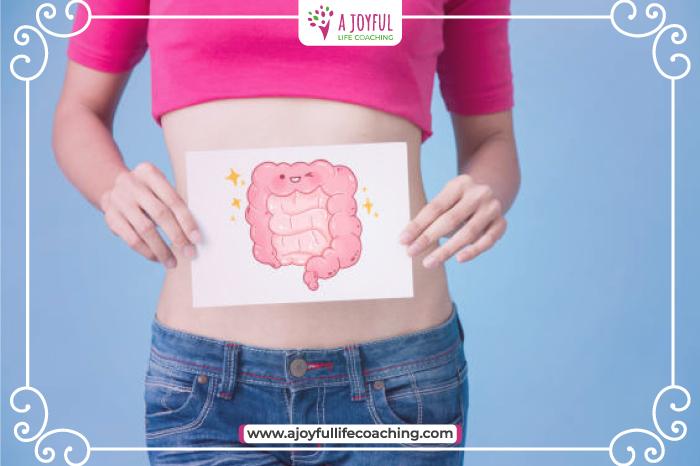
The digestive system is responsible for breaking down and absorbing nutrients from the food you ingest, which your body then utilizes to fuel and nourish itself.
“Gut Health” can be defined as the balance of bacteria that inhabit the digestive tract. It is also known as your digestive system. Your digestive system comprises several organs that work together to process and absorb the nutrients in your meals.
There are few things more discouraging than having a day ruined by stomach troubles, including constipation, gas, and bloating. Your “Unhealthy Gut” is the cause of these symptoms.
What is Acne?
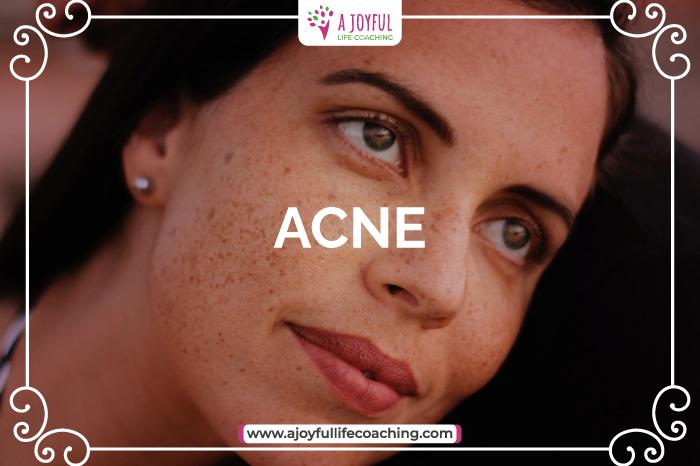
Blocked pores are a common acne symptom caused by hair, sebum (an oily fluid), bacteria, and dead skin cells obstructing the pores. The accumulation of these obstacles causes acne and other skin problems. Eczema is by far the most prevalent skin disorder in humans. According to the American Academy of Dermatology, up to 80% of people between the ages of 11 and 30 may have acne at some time in their life.
Several spots on your skin may signal that you need to address your inner beauty habits, gut flora, and any nutritional or hormonal imbalances since the skin is an excellent indicator of what’s going on within the gut. Start with internal modifications rather than outward ones to get the most out of the gut-skin axis.
What does gut health have to do with acne?
Many inflammatory skin problems, such as acne, rosacea, eczema, and psoriasis, have been linked to gut microbes. Acne patients are more likely to have digestive issues, albeit this is unlikely to be the major cause.
Excess skin cells clog the inside of the hair follicle, causing acne and preventing sebum outflow. Consequently, your immune system reacts by inflaming the affected region, enabling infections to thrive. More than 70% of your immune cells reside in and are influenced by the microbiome of your digestive system.
The immune system, especially the skin’s, may be better controlled if certain beneficial bacteria activate soothing immune cells.
A dysbiotic (unbalanced) microbiome may lead to a leaky gut, so keeping a healthy microbiome is critical for excellent skin.
When you have a leaky gut, inflammatory compounds produced by dangerous bacteria (such as lipopolysaccharides, or LPS) flow from the gut microbiota into the circulation. Skin inflammation is one sign of a systemic immune response generated by these stimuli.
Because of this negative interaction with the immune system, researchers believe dysbiosis and the resulting leaky gut are key causes of acne.
Symptoms of acne and unhealthy gut
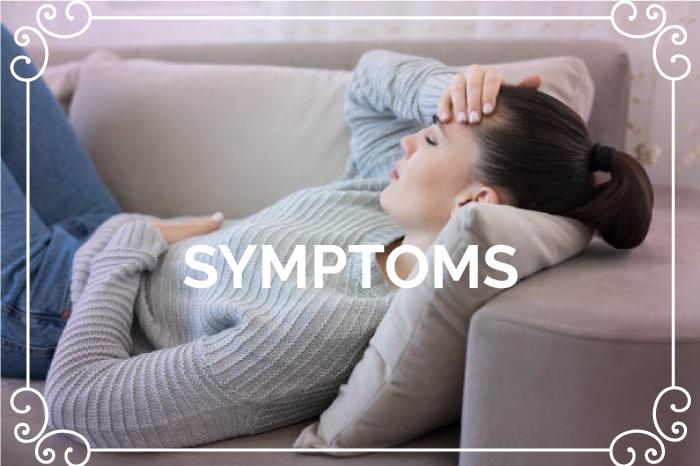
There are many places on the body where acne is more likely to appear: The back and chest are also affected by acne in roughly one-fifth of those who suffer from acne on the face.
There are other symptoms also found in the unhealthy gut and acne patients, such as –
- Bloating, gas
- Constipation and diarrhea
- Acne vulgaris or cystic
- Rosacea, psoriasis, rashes, and other inflammations
- Migraines
- Illnesses such as colds, viruses, etc.
- Fatigue, low energy
- Muscles and joints ache
- Food allergies, intolerances, or sensitivities
- Autoimmune
More than 15 signs of unhealthy gut can be linked to other diseases.
Types of Acne

Most acne occurs on the face, forehead, chest, shoulders, and upper back. These areas have the most oil glands. Acne treatment is based on the severity of the condition.
- Blackhead – lumps on the skin that seem black or yellowish are not loaded with dirt but rather black because the inner lining of the hair follicle creates color
- Whiteheads – feature the same visual characteristics as blackheads, but they are often more solid and do not rupture when crushed.
- Papules – Inflammatory little lumps that may be red or pink and may develop.
- Pustules- Pus-filled pimples. They resemble whiteheads that are wrapped by red rings in appearance. If plucked or scraped, they have the potential to leave scars. Resemble papules differ because they have a white tip in the center and are produced by an accumulation of pus.
- Nodules – Acne that is hard and embedded deep inside the skin. They are cumbersome and uncomfortable.
- Cysts – these big pus-filled lumps that resemble boils and are the most dangerous in terms of leaving lasting scars are acne’s most severe manifestation
Acne From Inflammation

SIBO (small intestinal bacterial overgrowth) has the potential to induce widespread inflammation in the body. When bacteria multiply in your intestines, such as in SIBO, it produces inflammation, and acne is the body’s response.
This is why consuming certain foods when suffering from SIBO, IBD, or Celiac Disease increases acne breakouts. Wheat, dairy, and sugar cause gut inflammation aggravating SIBO symptoms and treating acne.
SIBO is responsible for more than only acne. It has been associated with rosacea. Rosacea appears as a rash or as red or pink pimples.
According to a study, Rosacea individuals are more likely to develop SIBO or IBS. According to one research, focusing on your stomach may help reveal that limiting small intestine overgrowth may help with rosacea.
Acne From Leaky Gut
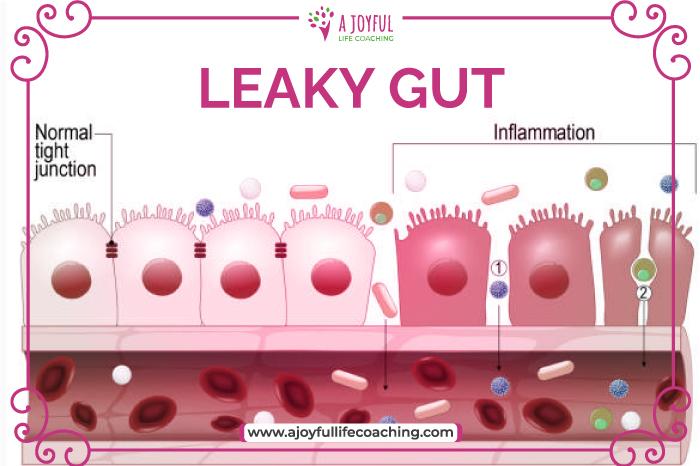
A “leaky gut” occurs when the lining of your digestive system is compromised. Partially digested food or contaminants may enter the circulation when this happens, triggering a systemic inflammatory response and acne. A leaky gut may also result in hormonal imbalances that produce acne-inducing androgens.
Gut bacteria produce LPS endotoxins. Endotoxins are constantly present, regardless of whether your gut is healthy or leaky. LPS endotoxins affect both healthy and acne-prone persons differently. Acne patients will most likely have a negative reaction due to their permeable stomachs (as would be the cause in someone with a leaky gut).
What foods can cause acne?

Acne is caused, for the most part, by hormonal shifts that occur inside the body. There is evidence suggesting that diets high in sugar, skim milk, and whey protein may induce acne outbreaks; however, this theory is still up for debate.
If you have food-related skin disorders, it’s vital to remember that there is no one solution since everyone’s body is unique and food has varied effects on individuals. Foods that cause inflammation in the skin include cow’s milk, alcohol, and even gluten, all common culprits.
How is acne with an unhealthy gut diagnosed?
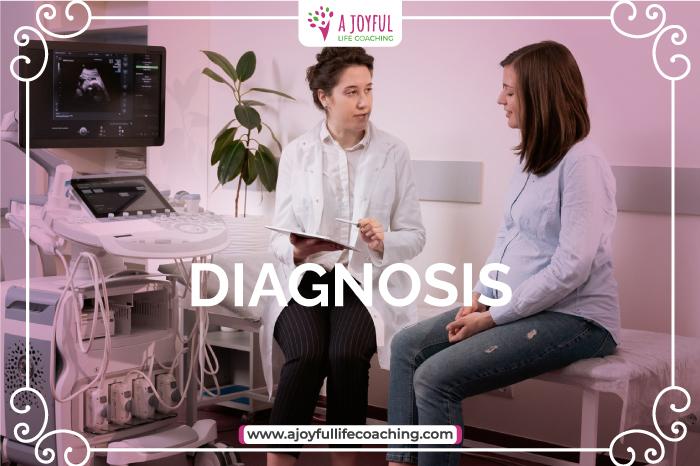
Acne should be diagnosed through a skin examination by a medical practitioner. The dermatologist may also ask whether you are under a lot of stress or if your family has a history of breakouts.
Acne is a hereditary trait. Women in their adolescent years may be asked about their menstrual cycles and acne because research has shown a connection between the two. If you see a sudden and severe breakout of acne in an aged person, it may be a sign of an underlying medical issue that needs to be addressed.
How is acne with an unhealthy gut treated?
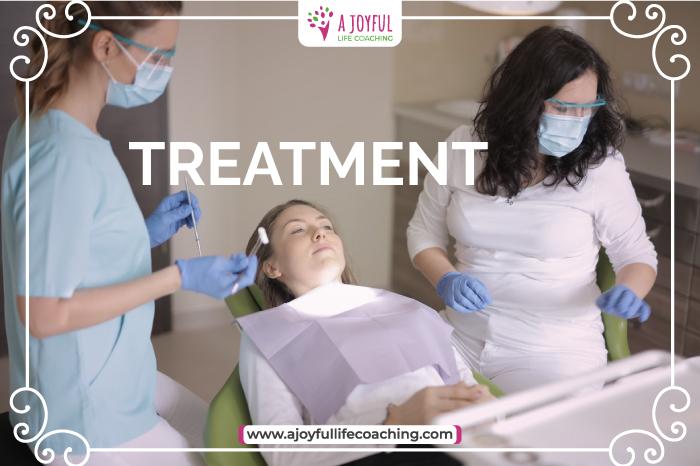
Your doctor may recommend over-the-counter medications. Prescription medicines may be required depending on the severity, age, type of acne, and success of OTC therapy.
Contraception may help women with acne. The FDA has authorized three birth control pills for the treatment of acne. Estrogen and progesterone are present in all four (a natural form of steroid that helps regulate menstruation).
Some medications and therapies work. They address the causes of acne. Your condition may need one or more of these.
How can I improve my gut health for acne?

Acne affects people of all races and ages, but teens and young adults are most likely to get it. Guys are more likely than girls to have acne when they are teenagers. Acne can last well into adulthood, and when it does, women are more likely than men to have it.
The tricks we talked about are 2 things – prebiotics and probiotics.
Probiotics are good strains of bacteria that live in the gut. Probiotics can be found in yogurt and pills. Probiotics help restore your gut flora by giving you more healthy bacteria and getting rid of the bad ones.
Prebiotics are like food for good bacteria, so they like them. Prebiotics help good bacteria grow in the gut’s microbiome and get rid of bad bacteria.
If you want to improve the balance of bacteria in your gut and reduce acne, you need to eat both prebiotics and probiotics.
There is a battle between good and bad bacteria in your gut and on your skin. To win the war, your good bacteria have to get rid of the bad ones and fix the damage they did while they were in charge.
The importance of prebiotics and probiotics for acne

Acne and intestinal health can be helped by prebiotics and probiotics. But how?
Probiotics stop harmful bacteria from taking over the body. Probiotics stop acne by stopping P. acnes from growing and by reducing inflammation throughout the body. The best way to treat acne is with a supplement that has L. Acidophilus and L. Bifidobacterium in it.
Probiotics that can handle stomach acid are Lactobacillus, Bifidobacterium, and Streptococcus. Look for a probiotic that has an enteric coating, which is a barrier that keeps stomach acid from breaking down the pill or capsule. This makes it easier for good bacteria to get to your small intestine, where they can crowd out bad bacteria.
Because prebiotics are similar to food for beneficial bacteria, those bacteria like consuming them, in the microbiome of the gut, prebiotics encourage the growth of beneficial bacteria and facilitate the elimination of pathogenic bacteria.
Diet plan for acne and unhealthy gut
You can use this 7-day meal plan to improve your gut health and prevent acne from ever happening. It includes foods rich in probiotics and prebiotics, which can help you improve your gut health.
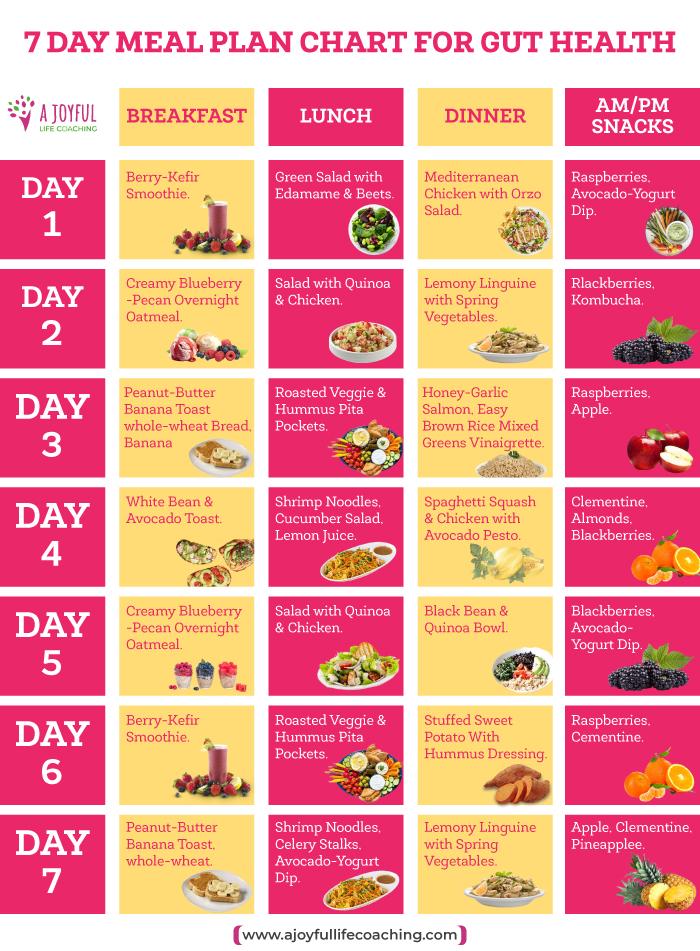
Conclusion
In order to get rid of acne, you must begin with your digestive system. If you’ve tried every topical medication on the market and still have acne, consider shifting your attention inside and concentrating on putting your gut in order.
Eating a nutritious diet and taking prebiotics and probiotics on a regular basis may help restore a healthy microbiome in the gut. “Leaky gut” syndrome may be improved, as well as the appearance of wrinkles and acne.
Frequently Asked Questions
1. Can Gut Bacteria cause acne?
⇒ Yes, they can. Blocked pores are a common acne symptom caused by hair, sebum (an oily fluid), bacteria, and dead skin cells obstructing the pores. The accumulation of these obstacles causes acne and other skin problems. Eczema is by far the most prevalent skin disorder in humans.
2. Can probiotics help clear acne?
⇒ Yes. LPS endotoxins are produced by gut bacteria. Endotoxins are constantly present, regardless of whether your gut is healthy or leaky. LPS endotoxins affect both healthy and acne-prone persons differently. Acne patients will most likely have a negative reaction due to their permeable stomachs (as would be the cause in someone with a leaky gut).
3. How do I take care of my skin?
⇒ a. Cleanse your skin with a moderate facial cleanser and warm water every day.
b. Use a moisturizer on a regular basis.
c. Using makeup is not a must, but you should use “non-comedogenic” products and remove your makeup every night.
d. Avoid touching your face with your hands.
If you’d like further support please contact me here.



